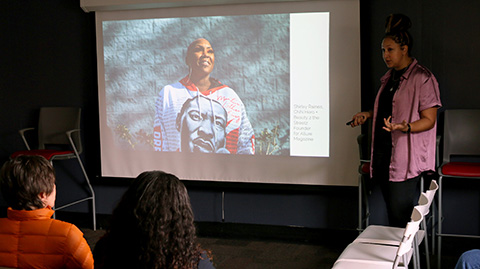Newsletter Edition: Spring 2023

Contributed by Gina Flores
This year’s Black History Month event lineup coordinated by the University Library and the Tom & Ethel Bradley Center was met with much anticipation and excitement, as the featured events were fully in-person for the first time since 2019. Musical group The Cookies and photographer Dr. Tara Pixley cherished the opportunity to share their talent with the community.
Tara Pixley, Ph.D. is a queer, Jamaican-American photographer, filmmaker and media scholar based in Los Angeles, where she is an Associate Professor of Journalism at Loyola Marymount University. She is a 2022 Reynolds Journalism Fellow and 2022 Pulitzer Center Grantee, a 2021 IWMF NextGen Fellow, a 2020 awardee of the World Press Photo Solutions Visual Journalism Initiative and a 2016 Visiting Knight Fellow at Harvard University's Nieman Foundation for Journalism. Pixley was welcomed to the campus on February 21 in an event titled “Rebel Vision: Black Female and Non-Binary Photographers – a Photographic Presentation and Conversation with Tara Pixley,” co-hosted by CSUN Black House and moderated by the Tom & Ethel Bradley Center’s director José Luis Benavides and historian/archivist Keith Rice.
“Since the Bradley Center is a photographic archive, we are always trying to establish relationships with underrepresented photographers. Dr. Pixley is conducting academic research on the field of photojournalism with a focus on photography produced by female, queer, gender expansive, and non-conforming gender identities,” shared Benavides.
Benavides looks forward to a continued relationship with Pixley for advice, support, partnership, and a possible affiliation with the Tom & Ethel Bradley Center, either individually or through the Authority Collective – an organization dedicated to establishing equity in visual media, which she co-founded.
In a candid interview with the Library’s Black History Month committee chair Keith Rice, he shared the vision for the Black Resistance theme and his role in sourcing The Cookies band for a poignant Valentine’s evening performance.
Why did you choose The Cookies band?
Being that the Black Resistance was the National Black History Month theme for 2023, we wanted to explore resistance in creative ways. In spite of having to endure 400 years and counting of oppression, Black people have always used their music as a form of resistance. In the antebellum South, spirituals were a vital form of folksong among enslaved people. They were used as a form of coded communication to escape from slavery in "Swing Low, Sweet Chariot," as a message about the need for change in the 1960s through Sam Cooke's "A Change Is Gonna Come," and the funky pride-filled resistance of James Brown's “Say It Loud, I’m Black and I’m Proud.” The Cookies were an excellent choice to demonstrate the power of Black resistance through songs because more than just playing the songs, they took possession of the songs and exposed the pain, sorrow, and joy that brought about their existence.
How did you connect with The Cookies band?
I started doing oral history interviews with L.A-based musicians that I worked with when I was a sound engineer. I had worked with Bobby Watson in Japan over a decade ago and got in touch with him about doing an interview. Bobby Watson is the bass player for the R&B group Rufus, featuring Chaka Khan. He is also the bass player for The Cookies. The night before the interview Brandon Lien, the Bradley Center videographer and I went to hear the Cookies perform in Burbank.
I had worked with Bobby in Japan some years ago and know from that experience and his work in Rufus that he is a super talented bass player. Maxayn Lewis, Allen Hinds and Donald Barrett are equally as talented in their own right and collectively they put on a show that often feels spiritual in their interpretation of Jazz, Gospel, R&B, and Rock and Roll. I asked The Cookies if they could perform a collection of songs that represent resistance in music to black oppression in the United States. They found it to be an interesting challenge to their artistic capabilities and agreed.
How was the turnout at the two Black History Month events, and were any notable comments made by the artists at the events?
Although both events were lightly attended, the small audiences appreciated the intimate experience. Members of the audiences at the two events were able to have an extensive amount of time to engage in conversation with both The Cookies and Tara Pixley. All of the attendees engaged with the artists, garnering a wealth of knowledge from their experiences in their chosen fields.
Bobby Watson revealed that out of all his success in the music business some of his fondest memories were of his early childhood years growing up in Arkansas near the Mississippi River.
Tara Pixley revealed although there have been advances for women of color photographers, it continues to be an uphill battle. She is very significant because she is an advocate for several groups that continue to struggle over their existence and inclusion. Although she is representative of several communities, we asked her to speak because she is in a field that Black women have been underrepresented in for a variety of reasons. Tara Pixley adds a new dimension to what a photographer looks like.
